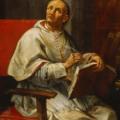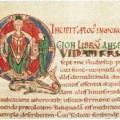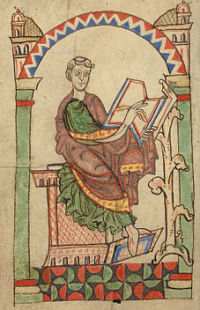204. A Canterbury Tale: Anselm's Life and Works
Posted on
Anselm offers more than his famous ontological argument, including a subtle account of human freedom.
Themes:
Further Reading
• B. Davies and G.R. Evans (eds), Anselm of Canterbury: the Major Works (Oxford: 1998).
• T. Williams, Anselm: Basic Writings (Indianapolis: 2007).
• B. Davies and B. Leftow (eds), The Cambridge Companion to Anselm (Cambridge: 2004).
• G.R. Evans, Anselm (London: 1989).
• J. Hopkins, A Companion to the Study of St Anselm (Minneapolis: 1972).
• K.A. Rogers, Anselm on Freedom (Oxford: 2008).
• R.W. Southern, Saint Anselm: a Portrait in a Landscape (Cambridge: 1991).
• T. Williams and S. Visser, Anselm (New York: 2009).







Comments
Complications
Considering that Anselm's ideas go back to Augustin, and Augustin's ideas go back to Plato (with some stations in between), I have the impression that it becomes more and more complicated, what was very simple in the beginning. And I have the impression that complications do no good to the truth in it. Somehow I have the expectation that real truth is simple. Maybe the later Aristotelian turn was motivated, too, by such thoughts? Cutting the Gordian knot ...
In reply to Complications by T. Franke
Complicated
Very true. I have often thought about the fact that the further you go into the history of philosophy, the more complex things tend to get since you are excavating more and more layers - like doing archeology on a site where things have been built on top of one another. This is especially so with a figure like, say, Aquinas who is consciously trying to draw together numerous strands of the tradition. But it applies to Anselm too.
Ma'at
Anselm's notion of truth seems to me to be helpful in thinking about as well as helpfully illuminated by the ancient Egyptian concept of "ma'at." Translators of ancient Egyptian texts vary widely in how they render this term in English because it means "justice" and it means "truth." This means there are references to doing ma'at, most naturally translated as "doing justice," and references to speaking ma'at, most naturally translated as "speaking truth." Given that Ma'at is also a goddess, Anselmian rectitude seems like a Christian version of ma'at.
In reply to Ma'at by Chike Jeffers
Ma'at
That's a nice connection, thank you! This concept comes up a lot on the Egyptian history podcast, which I listen to regularly:
http://egyptianhistory.libsyn.com/
Even if you don't listen this website has a lot of nice maps and images.
I'm having trouble wrapping
I'm having trouble wrapping my head around Anselm's idea that the will is only free if it is not coerced, and threat of certain punishment counts as coercion, and therefore Satan could not have known his terrible fate before he rebelled against God. Wouldn't that mean we have no free choice, knowing if we reject God we go to Hell and if we love Him we go to Heaven? Maybe it's easier to make Anselm's point about human beings since we cannot definitively choose or reject God in any one individual act, and therefore our knowledge of reward and punishment is more of a general kind, not partaining to any one act...? But with an angel, who makes one definitive choice and, moreover, has much more knowledge than humans, I definitely don't see how it works.
In reply to I'm having trouble wrapping by Thomas Mirus
Coercion
Yes, this is a tricky point. So his idea is basically that if I have certain _knowledge_ that things will go badly for me if I do X rather than Y, I will be prevented from doing X. This shows that he still retains a rather intellectualist idea about freedom (the will is led by reason or intellectual judgment, at least in cases of knowledge). In our case, we don't have knowledge, only belief, so that is why our freedom is not curtailed. The point about the angels being confirmed in goodness is also a strange one. There the idea seems to be that it is ok for them to be rewarded for a choice they made freely, by being made "safe" from choosing badly in the future; the reason they don't become unfree is that this confirmation in goodness flows from a choice they made when they were still ignorant of what might happened if they went against God (like Satan did). So apparently, apparent constraints on freedom that are the result of a free action don't count as real constraints on freedom. Bear in mind Anselm also wants to say that God Himself is free, despite His knowing what is good and being in some sense guaranteed to do it.
Add new comment